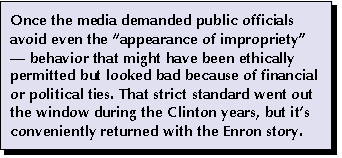 |
|||||||||
|
 |
||
|
 |
||||||||||||||||||||||||
|
||||||||||||||||||||||||
 |
||||||
|
||||||
 |
||||||
|
 |
||||||||||||||||||
|
||||||||||||||||||
 |
||||||||||||||||||||||||
|
||||||||||||||||||||||||
 |
||||||||||||||||||
|
||||||||||||||||||
|
|
|
For Immediate Release: Katie Wright (703) 683-5004 - Wednesday, January 16, 2002

Shifting Standards: Tyson's Presidential Ties Downplayed, but Enron's Links to Bush on Center Stage News Media's Scandal Double-Standards Who could ignore a story involving allegations of criminal wrongdoing against a huge company that's been a longtime supporter of the President? Well, journalists may be going nuts over George W. Bush and Enron, but the indignant network scandal machine barely twitched a few years ago when the company was Tyson Foods and the President was Bill Clinton.
Much of the media's Enron coverage has blended and blurred the large donations Bush's campaign received from company officials with the sad details of Enron workers whose pensions vanished with the company's bankruptcy, never stating what - if anything - Bush or his aides have done, or are suspected of having done, that was unethical. But during the Clinton years, the media compartmentalized individual allegations and questioned the motives of investigators who dared burden a President by forcing him to deal with hyped scandals. Clinton's Tyson ties were known before he reached the White House. "Tyson Foods has provided free airplane rides for the governor and his wife, and its executives have helped him with thousands of dollars in campaign contributions and industry fund-raising efforts that fueled Clinton's reelection campaigns and his race for President," the Washington Post's David Maraniss and Michael Weisskopf chronicled in a March 22, 1992 front-page article. They quoted company chief Don Tyson: "You've got to support the governor." Two years later, the networks learned that a Tyson lawyer, James Blair, had helped Hillary Clinton scoop up nearly $100,000 in profits trading cattle futures during her husband's first year as governor. Sounded fishy, but the networks weren't very excited. During the six weeks after the story broke on March 18, 1994, ABC, CBS, CNN and NBC had run just 18 stories on their evening newscasts - fewer than Enron got during the past week alone. Later in 1994, Clinton's Secretary of Agriculture Mike Espy was discovered to have received $35,000 in favors from Tyson. When Espy resigned on October 3, 1994, ABC's Peter Jennings mourned the departure of a "young man who seemed to represent so much promise." That was also the end of the story, at least as far as the three broadcast networks were concerned. While Independent Counsel Donald Smaltz convicted several lobbyists and extracted a $6 million guilty plea from Tyson, the networks aired only two stories from the time Espy left office until he was indicted 35 months later. The media could have scolded Clinton for the "appearance of impropriety" when they learned his wife pocketed $100,000 or when his Agriculture Secretary took improper gifts, but they didn't. (ABC's Nightline did devote an entire program to Espy's acquittal in 1998, however.) Now the appearance standard is back. "Enron was a company with deep political connections to the Bush administration, and so there are political issues to be dealt with," Jennings stated on January 10. Three days later on Face the Nation, CBS's Bob Schieffer hoped the bad press would motivate the President to support campaign reform: "[If] it makes the White House look bad because all those Enron people who gave so much during the campaign are now calling to see if the White House can help them a little, well, here's another thought: Outlaw the big corporate contributions. That way it won't look like the companies are calling in a chip every time they call the White House." But what did Enron's chiefs get for their calls, Mr. Schieffer? At its core, the "appearance" standard is a sloppy rule that allows the media to decide which scandals they'll promote and which they'll bury. Its selective application over the years reveals the depths of the media's scandal double-standards.-- Rich Noyes
Home | News Division
| Bozell Columns | CyberAlerts |








